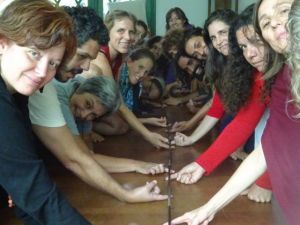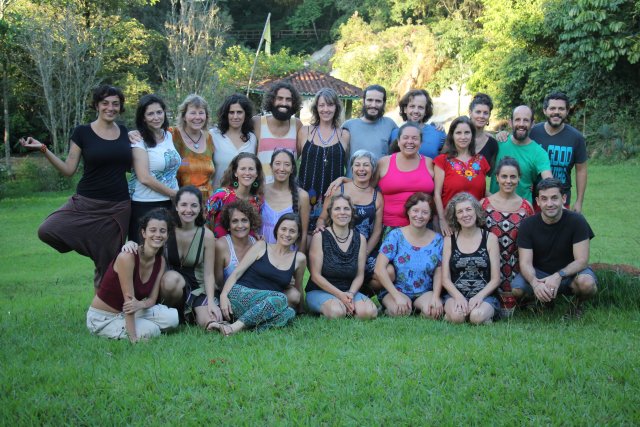 "There is a special magic in the circle: I can show myself completely, I am accepted and everyone feels together. This impressed me completely, because it gives me confidence and hope. When people come together in this way, completely new paths emerge. That is what I want to do."This was the conclusion of a participant in the "Circles of Trust" Forum Training in Brazil.
"There is a special magic in the circle: I can show myself completely, I am accepted and everyone feels together. This impressed me completely, because it gives me confidence and hope. When people come together in this way, completely new paths emerge. That is what I want to do."This was the conclusion of a participant in the "Circles of Trust" Forum Training in Brazil.
The Forum is a communication process that has been continuously developed since the 1980s in the MEIGA project and later in the ZEGG community. Today it is used in many communities to deepen communication, to create trust and to prevent conflicts. Ita Gabert, from the ecovillage Sieben Linden, has been working with communities and groups in Brazil for many years and was convinced: "There, too, more structured forms are needed to communicate deeply so that community projects succeed better.” In a workshop with Joanna Macy, I met Ita at a vision exercise. I had already facilitated Forum Trainings in Spain for several years and had my first experiences with them in Colombia and Ecuador. We realized that we had a common dream: to share our knowledge and experience from our communities in Latin America. We got together and developed a 10-day community course for projects in Brazil.

In this community course we offer besides theoretical inputs the Forum as a space, where we explore together themes of being human. Conflict topics such as power, money, relationships, love are explored on a deeper level and in their social context. In the non-judgmental "circle of trust" participants go into the middle and show themselves with what is alive in them. On the basis of self-responsible research and authenticity, everything can be what is - and so acceptance and testimony in deadlocked situations create an impulse for change. This is supported by feedback (mirrors) from the other group members.
The different cultural conditions were always exciting. On a superficial level, Latin Americans are much more cordial and open. It turned out, however, in the seminar setting that the inhibition threshold to show oneself becomes significantly greater as soon as difficult topics are addressed. And when feedback is included, the participants' fear of clear feedback is then very pronounced. A clear NO does not exist culturally. In a workshop that is about clear communication, this is of course important. And also worth to be considered, because we cannot simply plant our experiences in a different context. Ita and I made some adjustments in the process. All in all, the Brazilians had a great longing for true communication spaces and the gratitude of the participants was the motor for next experiments.
The South Americans asked to be able to lead the forum themselves - and so a Forum Facilitation Training with a 30-day course and 45 hours of practice was created, which took place for the first time in 2018 and now had its final module in February. Shortly thereafter, a second group started the course. In terms of content, we were inspired by the Forum Facilitation Training that I conducted with Achim Ecker in Spain (and which he had developed in the USA with Ina Meyer Stoll, who was inspired by Dolores Richter among others, etc.). Many of the exercises and experiential spaces that Ita and I as active researchers have done during our 35 years of community life were included.
"Which people come to your courses?" I am asked again and again. Of course there are people from existing communities, but also many others who work with people and in groups. We are proud of their diversity: from government employees to multipliers in favelas (slums), for whom we collect donations to finance their courses.
For myself, traveling with the Forum is a welcome way to travel. For I have always been less interested in places and buildings in a country than in people, ways of thinking, life plans and experiences. A course that focuses on exactly this is also a gift for me.
And it is a wonderful experience that essences that we have developed in our communities over many years of research can also enrich people in other cultures.
Communities often see themselves as models - we want to explore things on a small scale that we also consider important in the general social context: from the implementation of ecological innovations to more effective forms of organization and communication processes. And it is often so time-consuming to implement all these things that there is little time to pass on the results. In this sense, I am grateful for all the people who are holding and improving the basic structure at ZEGG, while I was able to spend the winter in the sunny south.
Barbara Stützel







